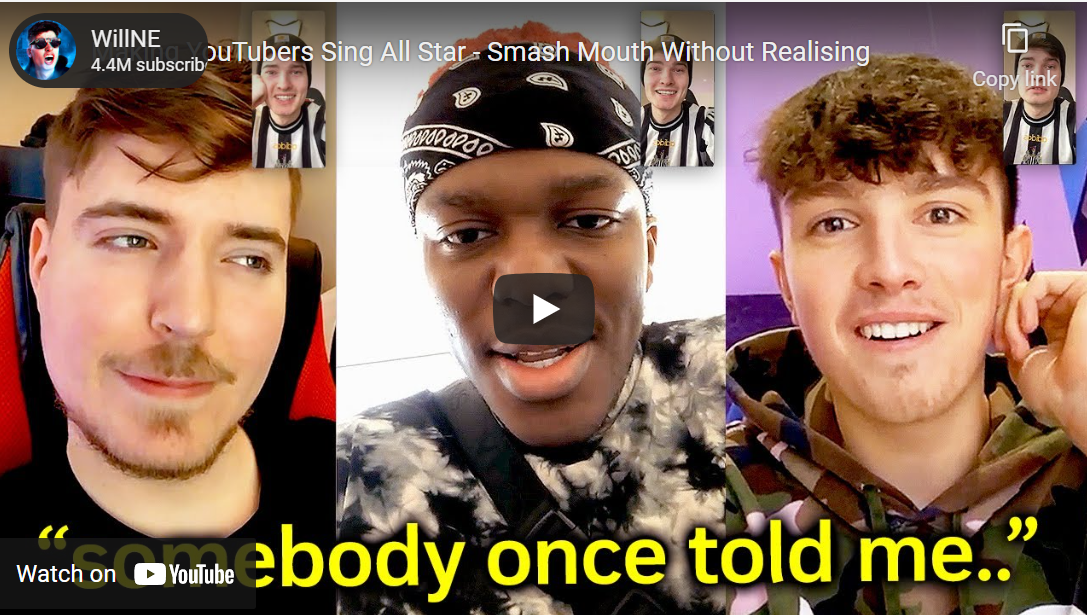on youtube + music criticism

I love youtube. I love youtube more than music. Despite my affinity for music writing, I’d take a good willne video over listening to any album.
I love to talk about youtube and know a lot about youtube because of the kind of stuff I watch there so whenever music writer twitter is reminded Anthony Fantano exists it’s always a lot of fun.
(willne, for the record, has about 1.5 million more youtube subscribers anthony fantano does and almost as many views on his main channel with not even 1/10 the number of uploads. it doesn’t matter i just think most people reading this won’t understand youtube scale and scale is relevant to understanding youtube)
Anthony Fantano is a dork. His content is not for me. Nor is it aimed at me, obviously, as despite my online google tracked behavior as a severe music loser I have never once been recommended a video by theneedledrop. This article isn’t really about his value, it’s about the misguided impulse to categorize him with music critics without acknowledging how important his medium is to the way his content has grown and how his videos are made.
The New York Times article about Anthony Fantano is mostly okay, I think. It mentions a couple younger creators who consider him influential which is relevant to the idea that he’s the “Only Music Critic That Matters (For People Under 25)” and it addresses a few other interesting points 1. connection to 4chan/reddit dude culture 2. his second channel and 3. his gender demographic breakdown.
Fantano’s jokes and his vibe is very much in line with the first wave of youtube commentary. It’s edgy humor based in reddit and 4chan, either obviously or as an adaptation of it. The delivery and style were more akin to gamer reddit dudes making fun of cringe videos than what written music criticism typically is. His appeal is based entirely on his persona and it’s based a lot in that feeling of inside community. His viewers are not reading your p4k piece (though I think they’d like the original Kid A review).
Youtube, especially this kind of appeal on youtube, is inextricable from PewDiePie. There’s a lot you can say about Felix Kjellberg, a lot that should be said about him, but this isn’t about him.. Except that Fantano points out he made a second channel in 2017. He cites youtube not pushing your videos into recommended if you upload too much on one channel. I kinda call bullshit on that. I expect he wasn’t making money for a totally separate reason. If you watch comedy commentary youtubers (or former ones), you know 2017 and even loose PewDiePie adjacency means trouble for your ad revenue as, in spring of that year PewDiePie made a video including anti-Semitic speech. This was unacceptable and triggered a massive pull out of advertisers that had a longterm effect on the ecosystem of certain kinds of things. There’s a shift in 2017 and channels previously with no issues regarding being “family friendly” now had issues.
I expect Anthony Fantano felt this hit. I think his association with 4chan/reddit culture aligned him too much with PewDiePie and I bet his ad revenue took a nosedive. So he, like a lot of creators, made a new channel to post extra content on. He created the channel in May of 2017, the same month the big PewDiePie controversy hit, and posted his first video that wasn’t a live stream in June.
To call back to the youtuber I mentioned before, Will Lenney runs the WillNE channel as well as a second called S2W. He makes loads of jokes on that channel about how his main channel doesn’t make money and S2W is where he gets a decent CPM. CPM, or Cost Per Mille, is the rate at which you get paid per 1,000 views. Different creators get paid at a different rate with regard to what kind of ads get played on their videos. It’s paid out by advertisers but is linked to what kind of content you make usually. (As a side note, I was surprised to find that his All Star video isn’t claimed by UMG or some other rights management company as fair use reasoning doesn’t seem to be given much weight on youtube but it doesn’t look like it is.) Content like his seems to have been representative of a huge sector of youtube that was hit pretty hard by youtube’s sharp turn into “pg family friendly clean” content.
I don’t think Will’s content was ever not family friendly, really. I don’t think the problem was with content being suitable for all ages at all. I think the problem was more that youtube decided they wanted to be associated with certain kinds of creators. Jake Paul click baiting kids with his girlfriend’s ass or Lele Pons posting a video where the whole joke is sex was fine and monetizable but if other creators so much as posted a video with any level of swearing it was demonetized and with demonetization comes suppression within the algorithm.
People who did anything which was even remotely PewDiePie adjacent (example here is gamer adjacent reddit reaction 2017 commentary youtubers) got suppressed and their CPM knocked. Creators like qcknd who make content about body modification/tattoos got their channels suppressed. “Kid” channels flourished (then got torn to shreds by a lawsuit saying hey it’s actually illegal to advertise to children like this). Blaming this stuff on an algorithm removes the idea that there is a corporate interest in pushing certain kinds of things to please advertisers.
In an experiment in CPM, Will made a video that was tagged and titled as a video about Bitcoin and FOREX trading to see if pretending to be a finance channel would get him more money. I think the beginning is really insightful video as far as understanding youtubers not as a monolith but as people who are rewarded by making certain kinds of content. You can watch it but the gist is that Will has about a $1 CPM vs a man who makes real estate, finance, bitcoin bullshit content had a CPM on a video of about $50. The rest of the video is a reddit video lol.
He followed it up the next week with how much money he made. In the original video he uses an example of a recent main channel video that got 1.7M views and made him just over $1,000. The video pretending to be about stocks and trading and that got like 450K views but made $3,000. It’s an interesting illustration in the way youtube rewards certain kinds of content with pairing ads that make more money. It’s not random.
Now I’m not asking you to sympathize with youtubers, certainly not a 24 year old man who lives in a big tower in Canary Wharf, but I do think, if you’re going to try to understand youtubers it matters to understand the ways youtube manipulates, promotes, and suppresses content. Youtube rewards longer watch time, so people make longer videos. Youtube says you can’t put midroll ads on videos shorter than 10 minutes, okay we make the video 10:01. Oh now it’s 8 minutes? OK 8:01.
I expect Anthony Fantano was hit in a similar way the minecraft/fifa gameplay to commentary pipeline dorks got hit so he made a second channel to make some slightly different content that wouldn’t be tainted with his 7 year history of video making.
The New York Times also talks about how his content is viewed almost exclusively my men. I don’t know exactly what the gender breakdown of most of my favorite creators are, but 94% male is incredibly high even for male dominated creator genres like the internet commentary stuff I really like and watch a lot of. But sexism in youtube is a real just as it’s real anywhere else. Even in beauty youtube the biggest creators aren’t women. James Charles and Jeffree Star and Manny MUA and Patrick Starr are all much bigger than most beauty creators.
Fantano’s audience isn’t because he’s a man doing the content. Fantano’s audience is that way because of the male honey trap that is reddit and 4chan culture. His association with that kind of comedy and the crossover of that culture is what makes his audience so overwhelmingly male. This isn’t something based in music criticism, it’s based in the internet culture of kids who grew up wrapped in 4chan and reddit. He has big influence over those kids and those kids like him because they see him as someone who understands them and they can take opinions and personality from, not because they like music criticism. They like music and they like his approach. They’re not diversifying their creator stream to include other music critics who do video content. Fantano is a testament to a section of the internet that people like The New York Times wouldn’t touch with a 10 foot pole.
I saw some equating of like deifying Fantano’s opinion with male music writers of the past having so much power. One man’s opinion is law. I think that’s as fair of a comparison as anything in media being dominated by one man or small groups of men. Most commentary youtubers are men and women get treated differently because they’re viewed as spreading drama where men are more charitably described. In music criticism, men benefit from the sexist view that men are more objective than women. Making women out to be emotional and compromised because of it is prevalent all over and it’s unfair.
I think there’s something to be said about sexism for Fantano being the biggest and most recognizable within the space of video music criticism but more because women doing it aren’t getting media coverage. Besides, I would argue that if you like written music criticism, you probably don’t have much interest in a video format of that. I also can almost guarantee his viewers do not and will never read music writing. Ever.
I also bristle against this implied assertion that just because he’s the most visible and you only know of him that he’s the only one doing it. While I don’t think music content is covered to the extent of movies and tv as far as video essays go, there are definitely tons people (even women! wow!) who do music based content in a similar vein. A lot of it is reaction based as I expect that’s what does well on youtube (it matters that it’s what’s doing well!) and doing tier list style rankings which, again, do well for views on youtube!
Here’s some good ones I’ve seen from creators with followings that are growing and doing well:
That last one is my a girl who goes by Caitlin Marie Reacts and she does a series where she listens to classic sorts of albums for the first time! Hey, I do that here! Her Lana Del Ray Ultraviolence video is fun and this stuff absolutely should be considered part of the music criticism landscape but, like with Fantano, it’s hard to compare to traditional journalism. At any rate, all these videos get good views and these channels are growing around the women in them which is exciting.
What I’ve pointed out is mostly focused in pop music and lack of women (or at least those I could find easily!) covering alt music on youtube is a rock sexism problem comparable to traditional journalism. The punk rock mba has some good videos and seeing that expand into people who aren’t just white men would be great. But again, the people who watch a lot of video content and those who read written music and culture criticism are frequently not the same demographic. I liked skatunenetwork’s ska live discussion. That’s absolutely criticism and understanding that works incredibly well in video format.
It’s stupid to ask a 78 year old man what he thinks about a youtuber. It’s stupid to equate traditional music journalism with the version of it on youtube or tik tok. Fantano does a version of reviews that is closer to traditional music criticism that a lot of what’s on youtube that does well but his success is not, in my opinion, fully as a result of the content he covers.
Fantano is, of course, classic music writer bait. The funny answer to why is because they’re jealous he makes money doing something based in what they do just in an industry that isn’t dead. The real answer has a lot of facets but it basically comes down to, what I consider, a false equivalent of his work (or any music criticism work on youtube) to theirs. It’s music criticism, sure, but through the lens of a youtuber and I’d like to posit to you that in order to talk about music journalism’s future we should consider the personality basis of youtuber success as something which can be learned from in the pursuit of growing an audience that trusts you as an individual.
But mostly I think it’s apples and oranges and most music journalists aren’t interested in understanding youtube. And that’s fine. Just don’t take the bait next time.
Miranda Reinert is a zine maker and law student based in Philadelphia. She is looking for friends. Follow me on Twitter for more on music and other things like polling the emo community on where good pizza in Philly is: @mirandareinert. Thanks for reading! There is no goal, only work!
I’m probably never going to make this a paid model newsletter but you can donate to my ko-fi if you enjoyed this and feel so inclined!



Comments ()